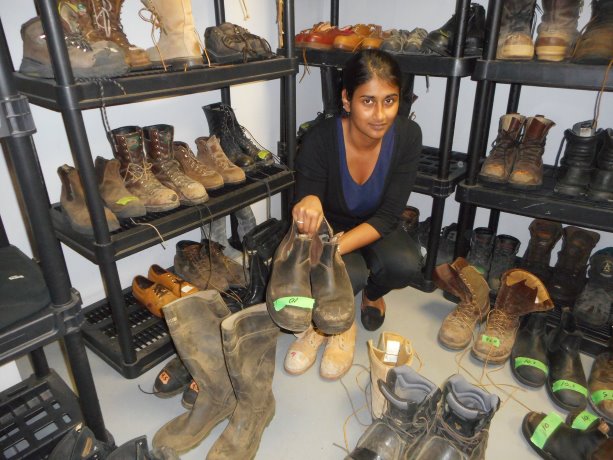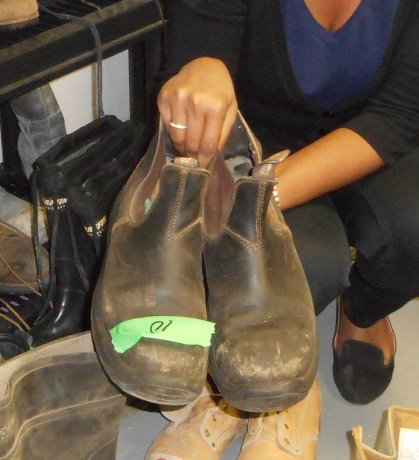The 3300 block of Vancouver’s arterial Kingsway resembles a slice of Chinatown, but it is what is behind the facade of discount stores and Asian eateries that is making a difference and sending a small army of entrants onto construction job sites.
"We don’t ask where they come from. We only ask what they need," said Jack Friebel, who is retired from marine engineering and volunteers for Working Gear Clothing Society, an eastside basement outlet that literally puts shoes on the feet of men stepping onto construction sites.
"Most people are only two or three paycheques from being on the street."
Men who have suffered some kind of setback but want to return to the workforce and are deemed work ready by a referral agency come to the clothing store. They are outfitted free of charge with work appropriate clothing ranging from suits for interviews to jeans, hard hats, gloves, safety goggles and boots.
Working Gear operates three days a week (Wednesdays and Thursdays from 6 to 8 p.m. and Saturday 10 a.m. to noon) and is staffed by volunteers. It relies on donations of clothing and funds to survive. The registered non-profit society also operates with a volunteer board of directors.
It only takes a few moments before the first young man walks through the door. He’s lined up a labourer job on a construction site but doesn’t have work boots.
"What size?" asks Riya Sharma, who leaves a day-job at a stem cell biotech company to volunteer one night a week for two hours. He replies size 10.
That’s a problem for Sharma. There is a chronic shortage of steel-toed work boots in the size 10 to 12 range. There are smaller sizes in good condition but the larger sizes offer up a poor selection and those available are rough around the edges.
Sharma sifts through what she has, does the best she can and finally finds a pair size 10.5 that might work for him.
He takes them plus some other work gear and is one step closer to that first paycheque and new boots, a move towards an apprenticeship and a new life.
The irony is that Working Gear, whose slogan is about putting the boots to unemployment, operates with little or no support from B.C.’s construction industry.
For nearly a decade it has fought the odds.
"We have just focused on existing," said Working Gear president Frank Kusmer, part of a group of local businessmen, professionals and lawyers who have kept the charity organization afloat, rounding up dollars at fundraisers, organizing boot drives and getting volunteers to donate a couple of hours a week to running the clothing outlet.
Each year, it helps 600 to 700 men return to jobs. It was only recently, through fundraising efforts and more individuals stepping forward, that Kusmer sees the potential to grow and expand beyond the stage of struggling to survive. It’s been almost a decade of hard work.
"It started in 2007 with a group of people who were working with men and women in the downtown eastside of Vancouver," said Kusmer, adding these founders came from a variety of organizations that dealt with individuals from different walks of life — immigrants, First Nations, youth, hardship cases, individuals who had gone through substance abuse rehabilitation, the unemployed and individuals released from correctional facilities. The common goal was getting a job. Some had skills and even attained Red Seal certification, or had gone through courses and were work ready. But, they were broke and had no work gear.
"There was really nothing for men," said Kusmer, adding that organizations such as Dress for Success were helping stream women back to work by providing workplace clothing.
"You can’t step onto a construction site without proper CSA approved steel-toed boots," said Kusmer, adding appropriate work boots can be priced at more than $100. "It was a barrier to getting the job. The group started working to fill that gap."
They began soliciting donations of work clothing, boots, jeans and rain gear but also suits and casual wear so that men could go for interviews. He points out that some of the men that come through the door have higher levels of education and just need that helping hand to return to the workplace. Strong support has come from men’s clothier Moore’s which does an annual suit drive and stocks the non-profit outlet with clothing.
But even after 10 years Working Gear still struggles on the work-gear side and steel-toed boots and rain gear are two items that fly off the shelf. BC Hydro has been a strong supporter supplying safety coveralls and boots on a regular basis. WorkSafeBC has also been a strong supporter donating safety gear and dollars.
Last year, WorkSafeBC donated $18,000 in safety gear and a stipend to help the organization pay utility and overhead costs, said spokesman Scott McCloy, who is also responsible for community relations.
"We see this as something that fits with our mandate to create a healthier workplace," said McCloy, adding while Working Gear is small, it is highly focus and "fulfilling a need in the community."
WorkSafeBC became involved in 2009 after its then CEO David Anderson saw a television newscast on the organization.
McCloy, who has also participated in fundraisers for the organization, said there has been some support from the construction industry but generally the work "flies way below the radar."
The system works on a referral basis from agencies that book individuals into the clothing centre. These agencies include: ACCESS Futures, the Canadian Council on Rehabilitation, Community Employment Services (Corrections Canada), Frog Hollow Neighbourhood House, Youth Employment Services (16 to 30 years), the First Nations Employment Society, nine WorkBC employment centres or affiliates, the Union Gospel Mission, the Immigration Services Society of BC and the YWCA.
Outfitting individuals is done on a just-in-time basis, Kusmer said. Individuals are either work ready or have a job lined up and need clothing for either the interview or getting onto a job site.
Kusmer said Working Gear is actively seeking to reach out to the construction industry and could also use more volunteers from construction companies to help collect clothing and boots.
Friebel, who has been volunteering for more than three years, said the rewards for volunteering are satisfying but non-tangible.
"You have to give of yourself to really give your own life meaning," he said.
Sharma agrees there is a satisfying sense of accomplishment.
"It is really about helping people get back on their feet," she said.

Volunteer Riya Sharma looks forward to helping put men back on their feet and into the construction industry, but unfortunately Working Gear, a non-profit society helping to clothe men returning to work, is battling a chronic shortage of large-sized steel-toed boots.
Photo: Jean Sorensen"










Recent Comments
comments for this post are closed